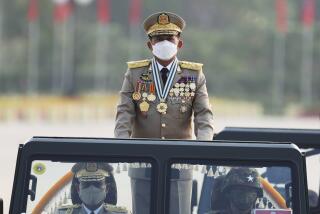Planning to Rebuild Military, Iraq Says : Mideast: Marking war anniversary, Saddam Hussein claims moral victory and vows to protect nation’s assets.
- Share via
AMMAN, Jordan — On the anniversary of the war that crushed his army, Iraq’s President Saddam Hussein told the Iraqi people Friday that his combative regime intends to rebuild “an influential military capability.”
His nationally televised, 45-minute speech hit hard the chords of sacrifice, honor and Arab leadership--though admitting that the Iraqi forces were defeated--and appeared aimed at kindling support at home rather than attacking his enemies abroad.
It was delivered one year to the day after American-led allied warplanes and missiles shattered his capital in the commencement of the Gulf War air campaign.
“Baghdad,” said the 54-year-old strongman, “will continue furnishing the Arabs with skills, science and technology, as we did in the past. But this needs an arm (a military) to protect it.”
Iraq’s armed forces, rated the fourth-largest in the world when they invaded Kuwait in August, 1990, were systematically destroyed in the war that began with the aerial bombardment of Baghdad and key communications centers throughout the country last Jan. 17.
Military analysts agree that the regime that launched two major Middle East wars within 10 years no longer has the capability to fight an offensive campaign beyond its borders. Hussein’s armor, artillery and air force were bombed and shelled to fractions of their prewar size, just enough to put down postwar rebellions by Iraq’s Kurdish and Shiite populations.
Kicking off a planned week or more of demonstrations designed to put a positive spin on the outcome of the Gulf conflict, Hussein repeated his claim that the Iraqi army and people had won a victory by standing up to the coalition of Western and Arab nations hammered together by President Bush to push the invaders out of Kuwait.
“If we see the confrontation in traditional material and technological terms, then the camp of the faithful was defeated,” the green-uniformed leader conceded. But he claimed a moral victory, describing the onset of the bombing campaign a year ago as a “day of pride and glory” for the Iraqis.
“A miracle was attained in this showdown,” he said. “Faith triumphed over atheism and right triumphed over wrong.”
To a country racked by inflation, shortages, sickness and malnutrition, Hussein promised prosperity without spelling out how he can achieve it. “The wounds in the economy will be healed,” he said, “and its prosperity will be everlasting.”
Since the war ended 42 days after the first bombs fell, Iraq has made no headway in easing the U.N. economic embargo that blocks all but food and medical imports and permits Baghdad to sell its oil only under conditions that Hussein rejects as an infringement of Iraqi sovereignty.
Sending the 17 million Iraqis a message that remilitarization will be a priority is dubious politics in their current straits. But Hussein rules largely by fear, not persuasion.
The demonstrations that began shortly after midnight appeared on television monitors here in Amman to be tightly staged; the major one was held on the street in front of the Information Ministry, where foreign press communications facilities have been set up.
In the days ahead, the claimed moral victory in the war will be celebrated with poetry readings, showings of patriotic art and other propaganda events designed for the few Western television crews now in Baghdad. The people of Baghdad have seen these campaigns before.
Meanwhile, in Kuwait city, a throng of women staged their own remembrance of the start of the war that liberated the sheikdom, carrying yellow banners and calling for the release of more than 2,000 Kuwaitis they say are still held in Iraqi prisons north of the border. Baghdad denies that any Kuwaitis are still captive, and Red Cross representatives say they have been forbidden entry into the prisons to check the reports.
For the Kuwaitis, the start of the air war was cause for celebration, even under occupation. Sarar Sayegh, a school principal, told a Reuters news service reporter at Friday’s march: “I will not forget that day. We were screaming and dancing, we didn’t want the sounds of the bombs falling to stop--it was like a symphony.”
More to Read
Sign up for Essential California
The most important California stories and recommendations in your inbox every morning.
You may occasionally receive promotional content from the Los Angeles Times.













